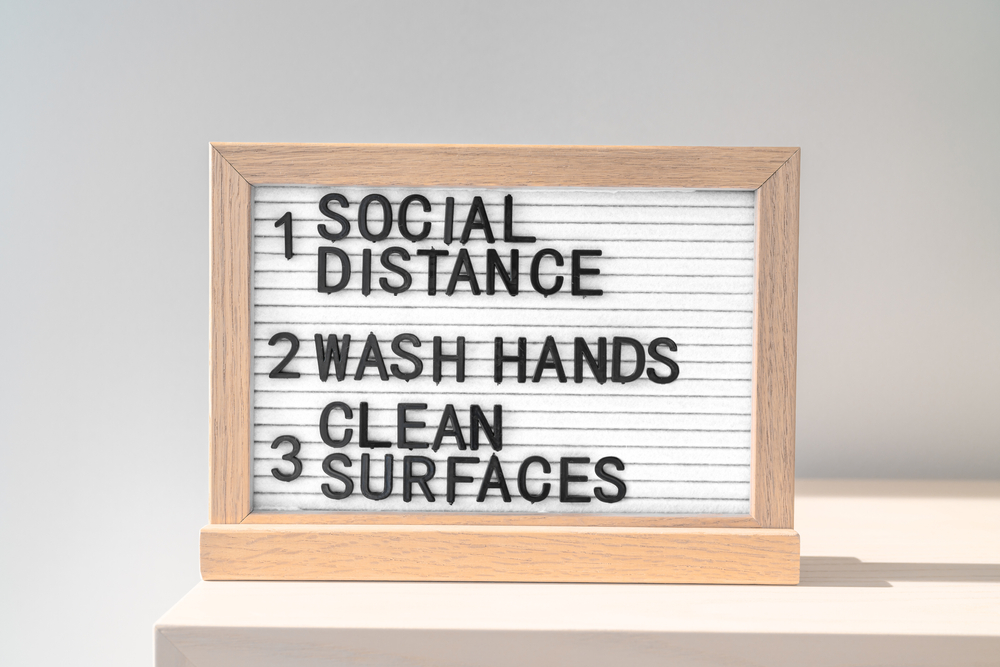HOA COVID 19- Georgia Updates:
On February 26, 2021, Georgia Governor Brian Kemp extended Georgia’s Public Health State of Emergency until April 6, 2021. He also extended his Order Empowering a Healthy Georgia through March 15, 2021. Governor Kemp has continued to extend these Orders on their expiration since last spring. Some states are beginning to lift restrictions, but Georgia’s restrictions remain in place for now.
All residents and visitors in Georgia are required to practice Social Distancing and refrain from Gatherings. Social Distancing is defined in the Empowering a Healthy Georgia Order as keeping space between yourself and other people outside of your home or place of residence. Persons should stay at least 6 feet apart from other people.
Under the Empowering a Healthy Georgia Order, “Gatherings” are still prohibited. Gatherings continue to be defined as more than fifty (50) persons physically present at a Single Location if, to be present, persons are required to stand or be seated within six (6) feet of any other person.
Because community associations are non-profit corporations, there are also multiple other mandates that apply both generally to community association operations and amenities and to all gyms and fitness centers, in particular. Homeowner and condominium associations remain bound to follow and institute all the mandates applicable to their community’s open amenities and operations.
GOVERNOR’S MANDATES FOR COMMUNITY ASSOCIATION OPERATIONS AND FACILITIES
Under Empowering a Healthy Georgia, organizations that are not Critical Infrastructure, which include homeowner and condominium associations, shall implement measures which mitigate the exposure and spread of COVID-19. Community associations are required to implement the mandates that are applicable to their property.
Georgia COVID HOA Restrictions
The current measures required include the following:
1. Screening and evaluating Workers who exhibit Symptoms of COVID-19;
2. Posting a sign on the front of the facility stating that individuals who have Symptoms of COVID-19 shall not enter the store;
3. Requiring Workers who exhibit Symptoms of COVID-19 to not report to work or to seek medical attention;
4. Enhancing sanitation as appropriate;
5. Disinfecting frequently touched surfaces regularly;
6. Requiring handwashing or sanitation at appropriate places within the location;
7. Prohibiting Gatherings during hours of operation;
8. Permitting Workers to take breaks and meals outside, in their office or personal workspace, or in such other areas where proper Social Distancing is attainable;
9. Implementing teleworking as practicable;
10. Implementing staggered shifts as practicable;
11. Holding all meetings and conferences virtually as practicable;
12. Delivering intangible services remotely as practicable;
13. Prohibiting handshaking and unnecessary person-to-person contact;
14. Placing notices that encourage hand hygiene at the entrance to the facility and in other areas where they are likely to be seen;
15. For retailers and service providers, providing for alternative points of sale outside of buildings, including curbside pick-up or delivery of products and/ or services if an alternative point of sale is permitted under Georgia law;
16. For retailers and service providers, open sales registers must be at least six (6) feet apart;
17. Point of sale equipment, including PIN entry devices and signature pads, should be frequently cleaned and sanitized;
18. Increasing physical space between Workers and patrons;
19. If the entity engages volunteers or has members of the public participate in activities, prohibiting volunteering or participation in activities for persons diagnosed with COVID-19;
20. Having exhibited Symptoms of COVID-19, or having had contact with a person that has or is suspected to have COVID-19 within the past fourteen (14) days and having not yet completed the Post-Exposure Quarantine Protocol; and
21. Ensuring ventilation systems operate properly and increasing circulation and purification of air within facilities as practicable.
GOVERNOR’S MANDATES FOR COMMUNITY ASSOCIATION GYMS AND FITNESS CENTERS
In addition to the applicable requirements above, community associations with gyms and fitness centers shall implement additional measures to prevent the spread of COVID-19, as practicable.
These measures include the following:
1. Placing signage at any entrance to instruct patrons that they cannot enter if they have been diagnosed with COVID-19, have Symptoms of COVID-19, or have had contact with a person that has or is suspected to have COVID-19 within the past fourteen (14) days and have not yet completed the Post Exposure Quarantine Protocol;
2. Placing signage at any entrance and throughout the facility to instruct patrons of the enhanced sanitation procedures, Social Distancing requirements, and other instructions and limitations, as applicable, set forth below;
3. If Workers are present at the gym or fitness center, screening patrons at the entrance and prohibiting entrance for patrons exhibiting Symptoms of COVID-19;
4. Limiting occupancy to enforce Social Distancing requirements and to prohibit Gatherings;
5. Utilizing contactless forms of patron check-in;
6. Providing Hand Sanitizer stations as available for patrons;
7. Providing antibacterial sanitation wipes as available at or near equipment and requiring users to wipe down the equipment after use;
8. Requiring Workers, if any, to patrol patron areas to enforce the equipment wipe-down policy;
9. Limiting use of cardio machines to every other machine or distancing machines to maintain acceptable Social Distancing between users;
10. Enforcing Social Distancing and prohibiting congregating between non-cohabitating patrons, especially in pools, group fitness classes, and areas where group sports regularly occur;
11. Encouraging patrons to conduct their workout and exit the facility without unnecessary delay;
12. Complying with the regulations for “Childcare Facilities” included in Section VII of this Order titled “Education & Children” if childcare services are provided;
13. In addition to the regular cleaning schedule, cleaning and sanitizing high touch surfaces, bathrooms, and locker rooms regularly throughout hours of operation;
14. Practicing Social Distancing between trainers and patrons as practicable;
15. Requiring no less than ten (10) feet of distance between patrons participating in group fitness classes; and
16. Requiring rooms and equipment used for group fitness classes to be cleaned and disinfected regularly.
ADDITIONAL SIGNAGE REQUIRED BY GEORGIA PANDEMIC BUSINESS SAFETY ACT
Community associations should also continue to post the signage required by the Georgia COVID-19 Pandemic Business Safety Act, which affords immunity from liability for damages in a lawsuit involving exposure to, transmission of, and infection with COVID-19 to community associations and other entities, individuals, and healthcare facilities and providers.
This Act became effective August 7, 2020 and applies to causes of action accruing until July 14, 2021, but currently does not apply to any causes of action accruing after that date.
The Georgia House of Representatives passed House Bill 112 on February 9, 2021 which would extend the protections under the Act for causes of action accruing until July 14, 2022. The Bill is now in the Georgia Senate for consideration.
To claim protection under the Act, homeowner and condominium associations must post the signage required by the law. The required sign must be posted at a point of entry to the premises that states in at least one-inch Arial font placed apart from any other text, a written warning stating the following:
WARNING
Under Georgia law, there is no liability for an injury or death of an individual entering these premises if such injury or death results from the inherent risks of contracting COVID-19. You are assuming this risk by entering these premises.
HOAs and condominium associations should place a sign meeting these criteria at each point of entry to each common area amenity open for use, including the clubhouse, pool, tennis court, fitness center and any other amenities open for use.
In addition to the above-referenced signage, community associations may require each user to sign an Assumption of Risk document so that all users expressly agree to assume the risk. So, when entering an amenity, a person will have assumed the risk of contracting COVID-19 both presumptively and actually.
COMMUNITY ASSOCIATIONS REMAIN OBLIGATED TO COMPLY WITH GOVERNMENT MANDATES
As we expected, the burden of proof and the presumed assumption of the risk imposed by the immunity law has had the effect of greatly discouraging the filing of lawsuits for transmission of COVID-19. However, community associations still have the legal obligation to comply with the Governor’s Orders and should also implement the Georgia Department of Public Health and CDC guidance to lessen the chances that an association and its board of directors will be found to have acted with gross negligence, willful and wanton misconduct, reckless infliction of harm, or intentional infliction of harm.
While acting in compliance with State and CDC guidance will make it hard for a claimant to win any damages, a decision to open a pool and other amenities will continue to expose each association to the possibility of incurring the cost of defense of such a lawsuit. Each HOA and condominium association board of directors must determine their association’s ability to comply with the requirements of the Governor’s Executive Orders and the guidance issued by the Georgia Department of Health and the CDC prior to deciding on whether to open, or keep open, the pool and other amenities.
VACCINATION IS NOT A CONSIDERATION FOR OPENING COMMUNITY ASSOCIATION AMENITIES
Many HOAs and condominium associations are also asking the effect that the continuing availability and administration of a COVID vaccine might have on a board’s decision and analysis of the risk of opening amenities. Based on guidance from the CDC and the National Institutes of Health, as well as the express warnings given to vaccine recipients, the vaccine reduces the risk of a person dying from the virus. To date, it is not certain to prevent a person from being infected or infecting others. In accordance with that understanding of the information about the vaccines, the risk of transmission continues to be dependent on cleaning and sanitizing the common areas, social distancing, and individual behavior.
Therefore, vaccination should not be considered in analyzing the risk of transmission on common areas. For the same reasons, requiring proof of vaccination as a condition for having access to an association’s amenities does not lessen the risk of transmission. In fact, such a condition of use may increase the risk of a lawsuit because of the impression of a safe facility if only accessible to people who have been vaccinated.
*****
CONTACT THE HOA ATTORNEYS AT NOWACKHOWARD TO HELP ADVISE YOUR BOARD OF DIRECTORS
At NowackHoward, we understand the importance of residents in community associations having access to their amenities and common areas and the urge to open these facilities this spring and summer. As always on our blog, this post is general information, and it is not legal advice. Your board of directors should contact your community association attorney for legal advice before making any decision on opening association common areas and to discuss the specific details and issues for your community, as well as the most current government mandates and guidance.
Our HOA attorneys represent condominium associations and HOAs throughout Georgia. To learn more about our practice, HOA attorneys or how we can help guide your community, contact us at (770)-863-8900 or email us at info@nowackhoward.com.
©2024 NowackHoward, LLC. Unless otherwise stated, all contents of this website are the sole property of NowackHoward, LLC and may not be reproduced in whole or in part without express written consent.


